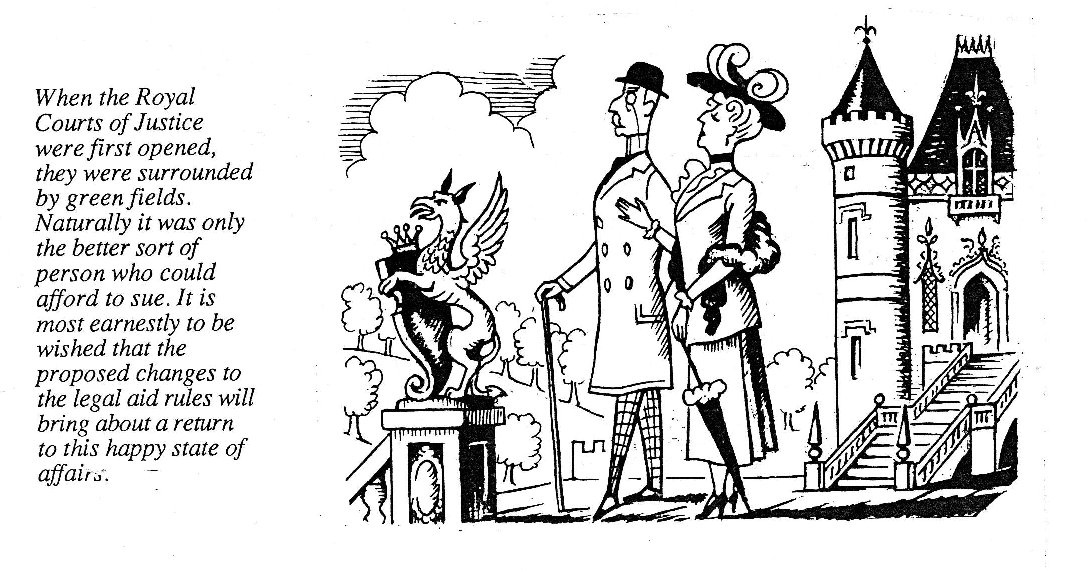Weekly Notes: legal news from ICLR – 14 November 2014
This week’s selection of legal tales from home and abroad is something of a judiciary special, with items about judges struggling with antiquated technology, a lack of diversity among those appointed to the bench, a complaint by one of them over the wasteful conduct of litigants, and a promise by another (retired) to help the
This week’s selection of legal tales from home and abroad is something of a judiciary special, with items about judges struggling with antiquated technology, a lack of diversity among those appointed to the bench, a complaint by one of them over the wasteful conduct of litigants, and a promise by another (retired) to help the press reform itself.
Some other recent items of interest:
- Latest edition (November 2014) of the Internet Newsletter for Lawyers, including Paul Bernal’s piece, Do we remember the point of the “Right to be Forgotten”?
- The PM’s “foreign fighters” plan: probably lawful, by Carl Gardner on his Head of Legal blog, analysing the lawfulness in domestic and international law of imposing restrictions on jihadists returning home after fighting abroad
- The Dangers of Transparency in the Family Courts, by Hannah Larsen on Keep Calm Talk Law, a useful survey of the issues surrounding media access to and reporting of court hearings involving children and vulnerable adults
- Tony Stock: A Flagrant And Appalling Miscarriage Of Justice Compounded Four Times By The Court Of Appeal, review of Jon Robins’ book by barristerblogger Matthew Scott.
Judiciary stuck in the past – official

Embarrassing admission made at Lord Chief Justice’s press conference
In technological terms the judiciary is stuck in a timewarp, according to the Lord Chief Justice, Lord Thomas of Cwmgiedd, at a press conference on 12 November. He admitted in response to a question about lack of funding, that when writing his judgments:
I am doing it on Word 2003 with the XP operating system which Microsoft is supporting by special arrangement. We do not have a proper system for people to do claims online. I mean it is wholly antiquated.
He is clearly frustrated that the judiciary do not have access to even moderately up to date software, and this is something shared by the MOJ and no doubt other government departments, who are struggling to keep up using antiquated, and therefore probably very insecure, operating systems and software.
Don’t quota me on this, but shouldn’t we be more diverse?
The Chief was asked about diversity in the judiciary. He alluded to a report by two QCs, which has just come out, Judicial Diversity: Accelerating Change, by Sir Geoffrey Bindman QC and Karon Monaghan QC. According to the report, senior judges are “almost exclusively members of a small class – white, male, heterosexual and with a socially and economically advantaged background.” To correct the lack of women and Black, Asian and ethnic minority (BAME) judges, the report recommended, inter alia, that
the time has now come for quotas. Progress towards a diverse judiciary has been too slow. Without a requirement to appoint suitably qualified women and ethnic minorities, we believe that the pace of change will remain intolerably low.
The Lord Chief Justice disagrees.
I believe as long as one has taken positive action and one appreciates that results will come and they are coming, I believe quotas are not necessary and I think there are huge disadvantages in them and other proposals that, in a sense, upset what is probably regarded as the finest judiciary in the world…
The report was commissioned in April by the Shadow Secretary of State for Justice, Sadiq Khan, as a guide to what a future Labour government could do to redress the balance.
Hat tip: UKSC Blog.
Little Bundles of Joy
…and the joy of little bundles
Reviewing some of the jawdropping amounts spent on costs in contested ancillary relief proceedings, Mostyn J waxed apoplectic in J v J [2014] EWHC 3654 (Fam), in which the parties disputing assets of £2.9m had spent a total of £920,000 in costs.
13. In my judgment the time has come when the law-makers in this country, whether they are legislators or judges, must stop saying something must be done and actually do something.
And he knows what to do. He proposes, first, that there should be a system of fixed pricing for such cases.
In my opinion a litigant should be able to demand a fixed price for each of the three phases of an ancillary relief case namely (1) Form A to First Appointment, (2) First Appointment to FDR and (3) FDR to trial.
Someone, I hope, will tell me what FDR stands for (apart from Franklin D Roosevelt, a drive in New York City). Mostyn J goes on to suggest, secondly, a costs cap, imposed by the court in ancillary relief proceedings: para 14. This would have the additional benefit of assisting unrepresented, or potentially unrepresented, litigants:
16. In my opinion only if these two steps are taken will the grotesque leaching of costs, such as has occurred in this case, be arrested. It might also have the beneficial consequence that the present volume of self-representation deriving from the wholesale withdrawal of legal aid from private family law cases is reduced. If a litigant on the cusp of self-representation knew at the start of the case how much it was going to cost for each phase then he may well opt for representation.

And then the judge turns his ire to the topic of bundle-abuse, at para 51:
For this case I was presented with an essential reading bundle, four further “court” bundles, four “additional documents” bundles, a bundle produced by the husband’s team, and two further ring files which came into existence during the course of the case. Twelve bundles in all. Many of them were so full that they could hardly be opened. I placed yellow stickers on all the pages outside the essential reading bundle. There cannot have been more than 50. Yet to look at them (sometimes many times) it was necessary in each instance for a file to be taken up, opened, put away (and so on) by me, the lawyers and the witness. The waste of time was simply prodigious.
The rant continues. Elsewhere he moans:
It is as if they had decided that the terms of the new PD27A (as issued on 10 April 2014) just did not apply to them.
In case you weren’t aware, that Practice Direction provides:
“Unless the court has specifically directed otherwise, being satisfied that such direction is necessary to enable the proceedings to be disposed of justly, the bundle shall be contained in one A4 size ring binder or lever arch file limited to no more than 350 sheets of A4 paper and 350 sides of text.”
He warns:
I intend to draw this also to the President’s attention with a view to him raising this further pressing matter as a matter of urgency with the Family Procedure Rules Committee. Perhaps it will be necessary for him to set up a special court before which delinquents will be summoned to explain themselves in open court…
(As a punishment, delinquent litigants will perhaps be “disembundled” and served with a yellow sticker of shame.)
Finally, and having regard to the parties’ conduct of the proceedings, he awarded the wife 38.9% of the assets, the husband 29.2%, and the lawyers and experts, by way of costs, 31.9%.
Caveat litigator!
Press regulation: IPSO facto
Sir Alan Moses delivers the Society of Editors Lecture
Fresh from his storming keynote speech at the Bar Conference the day before, Sir Alan Moses, delivering the Society of Editors Lecture at the SoE’s conference in Southampton on 9 November, said the Independent Press Standards Organisation’s ability to be a genuine regulator would not depend so much on the nature of its conclusions but on the processes and procedures by which they are reached.
Apologising for not delivering the hellfire sermon that sinning editors may have expected, Sir Alan said
We do not want a boring defensive press : we want a free fair and unruly press ruled only by an independent regulator Ipso who will support you and encourage you to remain so.
The best weapon, he said, “is always reason and not the boot.” Those who, having had their lives turned upside down by breaches of standards to which the press had committed itself, had been “promised the earth” by the government.
And they have waited and waited and finally have been given what, shrouded by their veil of tears, looks to them like a sham.
Instead of unrealistic solutions, or the firing of a big bazooka, what an independent regulator chaired by a judge would offer was a “fair and proper consideration”.
People like to judge by results…but what is a result? Findings may go either way…just as in court the result will not please both the opposing sides…the court cannot decide both ways, even if when you read some judgments it appears that the signposts are pointing in opposite directions. Somebody is going to be disappointed, someone is going to disagree. But what both sides are entitled to is fair and proper consideration of the evidence and a fair conclusion clearly reasoned.
His mission, he declared, would be to simply the rules and procedures under which compliance with the code of conduct would be judged, and ensure that regulation supported the press and enhanced its reputation, rather than simply attempting ineffectively to hinder its abuses of freedom of expression. He ended on a slightly bum note:
In the jangling cacophony on the internet, you the press and your readers want more than noise and flatulence.
Read the rest of it on the SoE website here.
Professional note: IPSO was developed by City law firms RPC and Bates Wells Braithwaite, according to a brief note in New Law Journal.
.
Feikh Shake: latest
Panoramic view of investigative lawbreaking
Was News of the World (now wash your hands) employing a fraudster? In one sense, and on his own admission, of course they were. He admits, in the Panorama programme on BBC, that he used “subterfuge” to get legitimate stories about genuine wrongdoing. But he seems, on the evidence of this programme, to have been an agent provocateur who created the very wrongdoing which he exposed. The stinger stung, even his application to the court to prevent the programme revealing his image was rejected.
Now a solicitor, Mark Lewis, who has acted for victims of phone hacking, is suggesting the claims over Mazher Mahmood’s frauds could be far greater.
However, Mahmood denies any wrongdoing and claims the programme is based on evidence from victims and people with a grudge against him.
Watch the programme: The Fake Sheikh Exposed.
Read all about it, in the Independent: Fake Sheikh Mazher Mahmood: Lord Goldsmith calls for review of convictions as undercover reporter is exposed.
.
Conflict of in-laws
British consulates offer same sex marriage in other jurisdictions
The list of countries where you can get married to another member of the same sex in the exclusive location of the British Consulate was amended on 11 November to include Germany. This brings to 25 the list of countries which do not currently offer the service to British nationals under local law and for which, therefore, the Consular Marriage and Marriages under Foreign Law Order 2014 provides this enticing alternative. The Statutory Instrument (No 1110 of 2014) came into force on 3 June but since then the list of countries has been updated twice (previously it was to add Lithuania on 17 June).
As a wedding venue, British Consulate may not be up there with the Guards Chapel, a village church, or a Bali beach, but with careful menu planning, a sober photographer and a decent bar, the event could be delightfully memorable.
Law (and injustice) around the world
Australia
New migration Bill may breach international law
Experts from the Human Rights Law Centre, UNICEF Australia, Save the Children, Plan, the Human Rights Council of Australia and Children’s Rights International have all attacked a Bill, introduced into the Australian parliament by immigration minister Scott Morrison on 25 September, on the grounds that it fails to meet Australia’s international obligations and risks the lives of men, women and children fleeing terror and persecution, according to Unicef Australia.
The Bill attempts to removes Australia’s international obligations; reduce the powers of Australia’s courts to uphold human rights; and, gives extensive discretionary control to the Minister for Immigration, said UNICEF Australia Chief Executive Officer Norman Gillespie. It “seeks to classify children born in Australia as ‘unauthorised maritime arrivals’ if one of their parents is labelled such, leaving those children subject to mandatory detention…”
Congo
General convicted of rape
Last week Gen. Jerome Kakwavu, renowned for his ruthlessness as a rebel leader during the Democratic Republic of Congo’s bloody conflict a decade ago, was convicted by a Congolese military court for the war crimes of rape, murder, and torture and was sentenced to 10 years in prison, according to Human Rights Watch.
Reporter Anneke Van Woudenberg notes:
The conviction and 10-year sentence of a single general for rape may seem like a meager achievement in a country where hundreds of thousands of women and girls, young and old, have been victims of sexual violence since Congo’s conflicts began in 1996. But it’s significant because the top brass in Congo seem untouchable for their crimes or those committed by troops under their command. Of the 187 convictions handed down by military courts for sexual violence between July 2011 and December 2013, recorded by the United Nations, only three were senior army officers at lieutenant colonel rank. … Kakwavu’s conviction begins to shatter the illusion that generals are shielded from the law. Other officers contemplating human rights abuses in Congo should take note.
India
New approach to court bundles hailed
Sri Lanka
Appeal filed in Supreme Court against Indian fishermen death penalty
According to the Deccan Chronicle:
India on Tuesday filed an appeal in the Supreme Court of Sri Lanka against a verdict of the high court awarding death sentence to five Indian fishermen in the island nation for alleged drug smuggling.
The fishermen, all from Tamil Nadu, were apprehended in 2011. According to a New Delhi spokesperson:
The Indian High Commission has approached some of the best legal brains of Sri Lanka to have a look at it [ie the judgment] and they are examining what would be the best avenue to ensure that those five fisherman can be brought back home,”
The court ruling has triggered fiery protests in parts of Tamil Nadu and sporadic violence in and around Rameswaram island as a large number of people staged protests over the sentence.
Tanzania
Officials at all levels engaged in illegal ivory trade
According to a report “Vanishing Point—Criminality, Corruption and the Devastation of Tanzania’s Elephants,” by the Environmental Investigation Agency, Tanzania lost more elephants to poaching between 2009 and 2013 than any other country in Africa—some 10,000 slaughtered there in 2013 alone. Yet in connection with a number of seizures that amount to 26.5 tons of ivory, efforts to stamp out the trade have resulted in only one conviction in Tanzania.
The most shocking allegations concern the degree to which Chinese officials participate in the ivory trade. Before a March 2013 visit to Tanzania by China’s President, Xi Jinping, the report notes, Chinese buyers “began purchasing thousands of kilos of ivory, later sent to China in diplomatic bags on the presidential plane.”
Full story: National Geographic
United Arab Emirates
New commercial companies law
Media reports have suggested that the new Commercial Companies Law (the New Law) was in part introduced to encourage foreign investment and company set up in the UAE. The big question is, asks Maxi Kussatz on Keep Calm Talk Law, has it?
Looking back to the differences between the Current Law and the New Law, it becomes clear that most of the new provisions do not encourage foreign investment and company set up. I would go as far to say that some of the provisions even discourage set up.
Could be a bit of an own goal for a jurisdiction that aims to encourage, and feed upon, foreign business activity (and arbitration).
And finally…
Another image with a facetious caption, this one dating from 1996. Plus ça change….
Finally, don’t forget this week’s ICLR Case Law alert – a list of the latest law reports and (free) case summaries from the home of law reporting.
This post was written by Paul Magrath, Head of Product Development and Online Content at ICLR. It does not necessarily represent any views of ICLR as an organisation.
.
